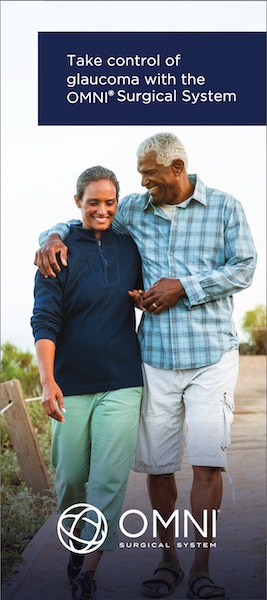What is the OMNI® Surgical System?
The OMNI® Surgical System is a safe and minimally invasive surgical procedure that helps reduce intraocular pressure (within the eye) in adult, primary open-angle glaucoma patients by opening up and restoring flow through the eye’s natural drainage pathway. This procedure can be performed at the same time as cataract surgery or on its own as a standalone glaucoma procedure.
The procedure is implant-free, allowing the eye’s natural drainage system to safely restore pressure. In several clinical trials, OMNI® has proven consistent in lowering eye pressure in patients by greater than 20%1 and, in some cases, OMNI® even eliminated the need for drops after surgery2.
How does the OMNI® Surgical System reduce eye pressure?
Glaucoma is the result of damage to the optic nerve. The damage is usually due to an increase in eye pressure caused by a blockage in the eye’s natural drainage canals. The blockage is similar to a clog in the kitchen sink. When fluid isn’t able to drain properly, it builds.
The OMNI® Surgical System helps an ophthalmologist “unclog the sink”, or relieve pressure buildup in the eye, by removing unnecessary blockages. OMNI® works to help restore the eye’s natural drainage system by removing unnecessary blockages across several pressure points in the eye.
What should I expect during and after the procedure?
The OMNI® Surgical System is a minimally invasive outpatient procedure that can be performed at the same time as cataract surgery. Unlike many other minimally invasive glaucoma procedures, OMNI® can be performed on its own, even if cataract surgery has already been done.
This procedure can be completed in a matter of minutes under local anesthesia, which numbs the eye to ensure comfort. Although every patient is different, recovery time is usually quick, similar to recovery from cataract surgery. As an outpatient procedure, you’ll go home the same day and have a follow-up visit, usually the day after surgery.
What are the possible side effects of the OMNI® procedure?
Minimally invasive glaucoma surgery, better known as MIGS, may be safer and less invasive than traditional glaucoma surgery. "Minimally invasive" means that microscopic equipment is used with these procedures, generally making them safer compared to traditionally invasive surgery. The most common side effects of the OMNI® procedure may include temporary elevation in pressure as the eye begins to normalize and bleeding in the eye.
What are alternative treatment options for glaucoma?
Treatment options depend on the type of glaucoma, severity, and personal preference. Treatment options range from oral and topical medications (like eye drops) and laser procedures to minimally invasive glaucoma surgery (MIGS) and more invasive surgeries, like trabeculectomies and some implants.
Many patients struggle to take their drops every day and/or manage the costs associated with those medications. By naturally restoring the eye’s drainage system with OMNI®, the dependence on drops has the potential to be reduced or even ended. If you continue to experience elevated eye pressure or struggle to use drops daily, a minimally invasive option like the OMNI® Surgical System may be right for you.
How quickly does the procedure start to work?
The OMNI® Surgical System restores the eye’s natural drainage system, allowing many patients to experience a reduction in eye pressure soon after the procedure. In some cases, the pressure in the eye takes a bit to normalize after surgery. It is not uncommon to remain on drops for a period of time after surgery. Your doctor will work with you to determine if medications can be reduced or potentially stopped long-term.
Every patient is different, so your doctor will schedule routine check-ins following the surgery to test your eye pressure and evaluate your progress after the procedure.
Am I a good candidate for the OMNI® procedure?
The OMNI® Surgical System is indicated to reduce ocular pressure in adult patients with primary open-angle glaucoma. Individual results may vary.
Talk to your doctor about whether the OMNI® Surgical System is right for you.
Download OMNI® Surgical System Patient FAQs
Flip through the OMNI® Surgical System Patient Brochure
_____________________________________________________________________
1. Brown RH, Tsegaw S, Dhamdhere K, Lynch MG. Viscodilation of Schlemm canal and trabeculotomy combined with cataract surgery for reducing intraocular pressure in open-angle glaucoma. J Cataract Refract Surg. 2020 Apr;46:644-645.
2. Vold SD, Williamson BK, Hirsch L, Aminlari AE, Cho AS, Nelson C, Dickerson JE Jr. Canaloplasty and Trabeculotomy with the OMNI System in Pseudophakic Patients with Open-Angle Glaucoma: The ROMEO Study. Ophthalmol Glaucoma. 2021;4:173-181. doi: 10.1016/j.ogla.2020.10.001.
Sight Sciences, Inc. has approved this Frequently Asked Questions document (FAQ) to help educate your patients on OMNI® Surgical System, which should be used in conjunction with the other digital patient education resources we have provided you. Similar to those other resources, the language in this FAQ document should not be changed or altered in any way. If you have any questions, please contact us at This e-mail address is being protected from spambots. You need JavaScript enabled to view it .
© 2021 Sight Sciences, Inc. 7/21 OM-1640-US.v1
Contact Us
Everhart Eye Associates
204 Virginia Street
Ashland, Virginia 23005
Ph. 804.752.7508 | Fx. 804.798.6876
Everhart Eye Associates welcomes new patients. We serve individuals from across Virginia. For an appointment, contact us at (804) 752-7508.
Hours of Operation:
Monday - Thursday: 8:30am - 4:30pm
Friday: 8:30am - 12:00pm
Notice of Privacy Practices
Please review to learn how we use and disclose medical information about you and your rights concerning these uses and disclosures.
Review Notice





